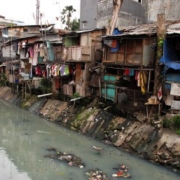Jakarta said goodbye to the infamous red-light district Kalijodo last week. For more than half a century, this collection of karaoke bars, brothels and gambling dens on the banks of the Angke River served as a playground for working-class residents of the capital.
After four people died in a road accident caused by a drunk driver who had been partying in Kalijodo, Jakarta Governor Basuki Tjahaja Purnama (“Ahok”) saw his opportunity. He gave the district’s 3,000 residents just 20 days to leave their homes. In typical brash style, Ahok said: “The problem with Kalijodo is that we have been listening and listening for too long.”
The Jakarta administration argued that the buildings in Kalijodo occupied state land, and it was important to return the area to its intended function as green space.
Rights organisations, including the National Commission for Human Rights (Komnas HAM), argued that the eviction process violated international standards for involuntary resettlement, and that the administration’s policies unfairly targeted poor residents, leaving large commercial developers occupying state land untouched.
But in the end these voices were in the minority. With Kalijodo’s reputation as a haven for crime and immorality, few Jakarta residents seemed sad to see its demise. Despite his oppressive approach, Ahok received near-universal praise in the media and online, with many impressed by the lack of conflict and the relative “efficiency” of the demolition.
Freelance photographer Imang Jasmine (Imam Syafrudien As) captured Kalijodo’s final moments.

Located on the border of North Jakarta and West Jakarta, Kalijodo was home to a number of criminal gangs. Days before the demolition, North Jakarta Police arrested one of the most notorious underworld figures, Abdul Aziz. Although police initially announced they were investigating Aziz for facilitating prostitution, he was eventually charged with stealing electricity to run his bar, Kafe Intan.

The Jakarta Post reported that of Kalijodo’s 3,000 residents, 1,405 people had jobs connected to the area’s nightlife, including 450 sex workers.

Kalijodo residents with Jakarta ID cards were offered low-cost apartments in Marundain in North Jakarta and Pulo Gebang in East Jakarta. Although many Kalijodo locals argued that they held land titles and paid taxes, only about 220 of the area’s residents were eligible to take up the offer.

A joint force of 6,175 public order officers, police and army officials were sent to oversee the demolition process on 29 February.

Ahok justified the heavy-handed approach by saying it was necessary to prevent the types of clashes that occurred during the eviction of Kampung Pulo residents in August 2015.

The week before the demolition, police confiscated 9,900 bottles of alcohol, 166 packs of condoms and 33 types of weapons from the area, leading to fears that residents planned to resist relocation.

This trader’s shirt reads: “There’s no such thing as fatigue when you’re trying to earn a living.”

Previous attempts to clear the area, most recently in 2003, had failed.

The red-light district will make way for 1.4 hectares of green space, including sports and education facilities. It will be called Kalijodo Park, Ahok said, adding that there was no need to be sanctimonious or pretend to hide the area’s past. “Enggak usah pakai tobat-tobatan tetap Kalijodo tanpa huruf H,” he told Kompas online.

Although the city administration appeared prepared for conflict, the region was mostly deserted when the bulldozers moved in on 29 February.











